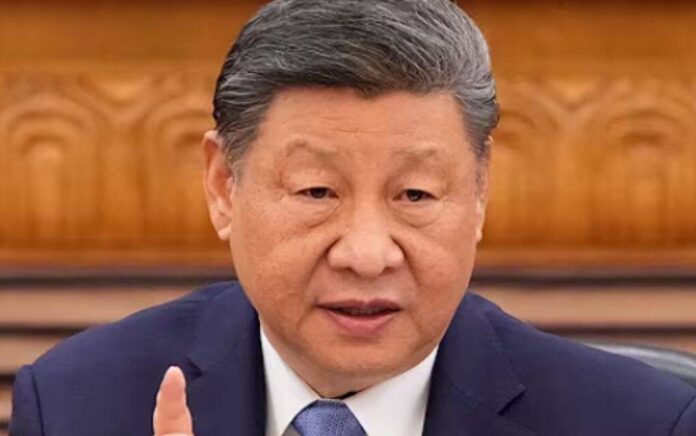
China’s threat to the U.S. continues to grow. In fact, it’s reaching a boiling point.
And China has made a disturbing confession that has the Pentagon sounding the alarm.
In a clandestine meeting last December in Geneva, Switzerland, Chinese officials delivered a stunning revelation to their American counterparts, according to a recent Wall Street Journal report. Amid escalating tensions over Taiwan’s future, Beijing openly admitted to orchestrating a series of cyberattacks targeting U.S. infrastructure—ports, water systems, airports, and more—in retaliation for Washington’s support of Taiwan’s independence.
The meeting, shrouded in secrecy, brought together high-ranking officials from both nations. Leading the U.S. delegation was Nate Fick, then-ambassador-at-large for cyberspace and digital policy, while Wang Lei, a senior cyber official from China’s Ministry of Foreign Affairs, represented Beijing.
The discussion was intended to ease doubts about China’s involvement in a string of cyber incidents. Instead, it became a moment of stark clarity. Wang dropped all pretense, linking the attacks directly to U.S. policies on Taiwan, which China views as a breakaway province destined for reunification.
For years, Beijing had deflected blame, pointing fingers at rogue groups like Volt Typhoon for cyberattacks on American targets. But in Geneva, Wang’s blunt admission shifted the narrative. Though the full scope of China’s role remained vague, U.S. officials left the meeting convinced that Beijing was issuing a deliberate warning: continued support for Taiwan would come at a steep cost. This came after the U.S. had cautioned China that targeting critical civilian infrastructure could be interpreted as an act of war, according to a former American official.
The Biden administration, caught off guard by the brazenness of China’s stance, shared details of the meeting with President Trump’s transition team. Both the State Department and the National Security Council have stayed tight-lipped, though the State Department reaffirmed its commitment to “take actions in response to Chinese malicious cyber activity,” calling the attacks “some of the gravest and most persistent threats to U.S. national security.”
China, meanwhile, has remained silent on the Geneva talks. In the past, its officials have dismissed similar accusations as baseless, claiming the U.S. is “using cybersecurity to smear and slander China.” Yet the timing of the meeting raises questions.
It followed reports that hackers tied to China’s Ministry of State Security had intercepted unencrypted communications from top U.S. officials, including those involved in the Trump and Kamala Harris campaigns.
The cyberattacks are just one piece of a larger puzzle. China has intensified military exercises around Taiwan, flexing its might in the region, while U.S.-China relations have plummeted to historic lows, fueled by Trump’s aggressive trade policies. The Geneva meeting, far from easing tensions, has cast a harsh light on the growing rift between the two powers.
A Rising Threat to American Security
Beyond the cyberattacks, China’s actions signal a deeper challenge to the United States. Beijing’s ambitions extend far past Taiwan, aiming to reshape global influence in its favor.
Its military buildup, including a rapidly modernizing navy, poses a direct counter to U.S. dominance in the Pacific. The Pentagon has repeatedly warned that China’s investments in technological developments could tilt the balance of power in critical conflicts.
Economically, China remains a formidable adversary. Despite Trump’s tariffs, it continues to dominate global supply chains. This leverage gives Beijing the ability to disrupt markets or choke off resources vital to U.S. industries.
Meanwhile, Chinese firms, often backed by the state, are expanding their reach into American markets, raising concerns about data privacy and national security.
Perhaps most alarming is China’s growing influence in cyberspace. The Geneva revelations confirm what many suspected: Beijing sees cyber warfare as a legitimate tool to assert its will.
From stealing intellectual property to targeting critical infrastructure, China’s cyber capabilities are evolving at an alarming pace. Recent reports suggest Chinese hackers have embedded themselves in U.S. utility networks, poised to disrupt power grids or water supplies in a future conflict.
Diplomatically, China is also gaining ground. Its Belt and Road Initiative has secured alliances across Asia, Africa, and Latin America, offering infrastructure deals that come with strings attached. These partnerships erode U.S. influence, creating a world where Beijing’s vision of governance—one that prioritizes control over freedom—gains traction. As China’s global clout grows, the U.S. faces a stark reality: a rival that is not just competing but actively working to undermine its security and values.
The Geneva meeting may have been a single moment, but it reflects a larger truth. China’s actions—cyber, military, economic, and diplomatic—are not isolated. They form a calculated strategy to challenge the United States at every turn, with Taiwan as just one flashpoint in a much bigger contest.
Stay tuned to The Federalist Wire.



















